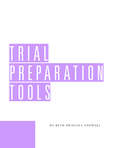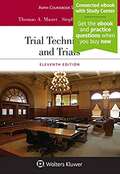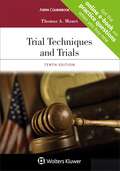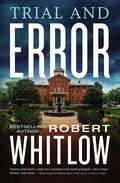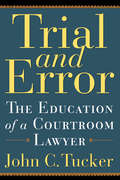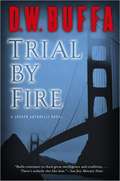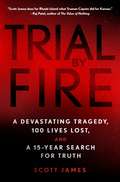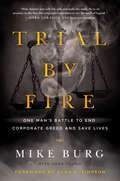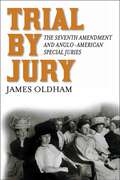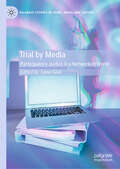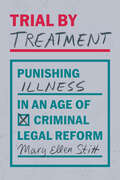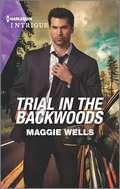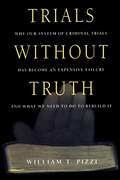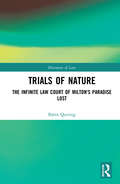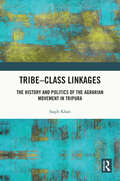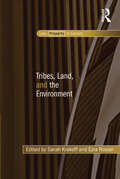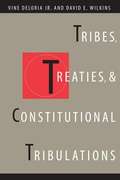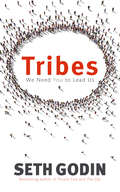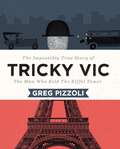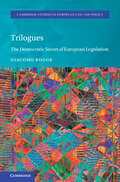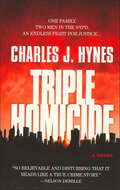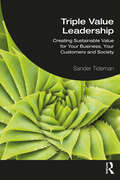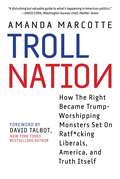- Table View
- List View
Trial Preparation Tools
by Beth OsowskiCompeting cases and clients can keep you from bringing enough hours, analysis, and organization to readying your cases for trial. Beth D. Osowski's Trial Preparation Tools can help. Use its strategies, tips, forms, checklists, calendars, and idea lists to be better prepared and more efficient. You'll also find tips for effective discovery, picking juries, and proving facts. * Practical checklists: You receive dozens of countdown calendars and to-do checklists that will help you stay organized. * Idea triggers: From theme possibilities through initial opening phrases to sentences for concluding closings, the idea lists will help you brainstorm possibilities for your cases. * Voir dire aids: Learn juror characteristics with the book's voir dire questions and juror questionnaires. Record and analyze your results with her juror selection matrices. * Powerful openings: Sample themes, writing suggestions, and delivery tips help you start persuasively.
Trial Techniques And Trials (Aspen Coursebook Series)
by Thomas A. Mauet Stephen D. EastonBy far the most thorough and detailed of the books in the field, Trial Techniques and Trials is a comprehensive yet concise handbook that covers all aspects of the trial process and provides excellent examples illustrating strategies for opening statements, jury selection, direct- and cross-examination, exhibits, objections, and more. Extensive examples are clustered into three groups: personal injury, commercial, and criminal for ease in finding particular areas of trial practice. Tom Mauet and Steve Easton, renowned for their skills both as writers and trial attorneys, break the trial process down into its critical components for better and quicker comprehension by students and practicing attorneys who have little or no trial experience. <p><p> New to the Eleventh Edition: <p>• Updates regarding recent amendments to the Federal Rules of Evidence <p>• Additional emphasis on presenting evidence and argument visually, not just orally, for modern juries <p>• Coverage of additional aspects of trial including site visits and foundation battles over emails and other electronic communications <p><p>Professors and students will benefit from: <p>• Integrated discussion of the strategy and psychology of persuasion particularly regarding jury selection, opening statements, and closing arguments <p>• Numerous illustrations from tort cases, criminal cases, and commercial trials <p>• Broad and flexible examples that allow readers to focus on either the plaintiffs or the defendants side of the caseor both <p>• Logical organization that follows the chronology of a trial process <p>• A companion website with additional examples, a trial notebook, and other tools for trial lawyers <p>• Video lectures about critical trial moments <p>• Video demonstrations of effective trial advocacy, including a complete jury trial
Trial Techniques And Trials (Aspen Coursebook Series)
by Thomas MauetBuy a new version of this Connected Casebook and receive access to the online e-book, practice questions from your favorite study aids, and an outline tool on CasebookConnect, the all in one learning solution for law school students. CasebookConnect offers you what you need most to be successful in your law school classes—portability, meaningful feedback, and greater efficiency. Trial Techniques and Trials unveils the strategies and thought processes that lawyers use in the courtroom as they present evidence and construct a persuasive argument. Tom Mauet’s clear writing and abundant examples explain and illustrate every step of the jury trial process. Comprehensive yet concise, the Tenth Edition provides authoritative coverage, from opening statements, to jury selection, direct-examination, cross-examination, exhibits, objections, and more. Trial Techniques and Trials, Tenth Edition, features: Integrated discussion of the strategy and psychology of persuasion—particularly regarding jury selection, opening statements, and closing arguments Numerous illustrations from tort cases, criminal cases, and commercial trials Broad and flexible use of examples that allows readers to focus on either the plaintiff’s or the defendant’s side of the case— or both. A logical organization that follows the chronology of a trial process Tear-away checklists for trial preparation and review Lectures on video of critical moments in a trial litigation, now on the companion website, in addition to a jury trial (on video) and a complete trial notebook (with forms)
Trial and Error
by Robert WhitlowA small-town lawyer has been searching for his daughter for eighteen years. Now another young woman is missing, and he&’s determined to find them both—no matter the cost.Buddy Smith built his law practice around tracking down missing children. After all, he knows the agony of being separated from a child. Not long after his daughter&’s birth, her mother ran away and Buddy never saw either one again.Gracie Blaylock has known Buddy her entire life, and now that she is clerk of court for the county, their paths cross frequently. When Gracie hears that a teenager in town has gone missing, she knows Buddy is the one for the case.The girl&’s parents are desperate for answers. Together with Gracie and Mayleah—the new detective in town—Buddy chases all leads, hoping to reach the missing teen before it&’s too late. And as he pursues one girl, he uncovers clues that could bring him closer to the girl he thought he lost forever: his own daughter.Master legal writer Robert Whitlow will keep you guessing in this gripping legal drama while reminding you of the power of God&’s restoration.Stand-alone legal dramaFull-length novel at approximately 120,000 wordsIncludes discussion questions for book clubs
Trial and Error: The Education of a Courtroom Lawyer
by John C. TuckerTrial and Error is a legal memoir that gives an unvarnished account of life as one of America's leading trial lawyers; detailing the path from nervous novice to the top of the legal profession. In 1958, John C. Tucker began a legal career that would lead the Chicago Tribune to call him "one of Chicago's finest and most idiosyncratic trial lawyers. " Now, in a book reminiscent of Scott Turow's classic One L, Tucker employs painstaking honesty and fascinating detail to illuminate the difficult steps in learning the trial trade and the reality of life as one of the country's leading civil and criminal trial lawyers. Free of the impenetrable language and self-congratulation found in the memoirs of many trial lawyers' memoirs, Tucker skillfully chronicles an extraordinary variety of engrossing cases. From the infamous 1969 trial of the "Chicago Eight" war protesters—including Abbie Hoffman, Tom Hayden and Bobbie Seale, heard before the notorious Judge Julius Hoffman—to one of the most important civil rights cases of the era, the Supreme Court decision that spelled the death knell for the corrupt political patronage system in Mayor Daley's Chicago, Tucker's career spanned three decades of legal landmarks. In Trial and Error Tucker becomes the star witness whose crisp prose and penetrating voice carries readers rung by rung up the legal ladder, altering common misconceptions of lawyers and their craft. Relating both the highs and lows, while also recounting tales from the trial of a giant Mafia gambling ring to a legal showdown with heavyweight champion Muhammad Ali, Tucker gives aspiring young attorneys, law students, recent graduates, and all fans of courtroom drama—and comedy—the chance to see it all through the eyes of the man in the middle of the ring.
Trial by Fire
by D. W. BuffaAttorney Joseph Antonelli finds that murder can be a very public affair in this moody and scintillating novel of love, loyalty, and revenge in the Edgar Award-nominated series. Joseph Antonelli's never lost a case he should have won... until now. Julian Sinclair is a brilliant young man--already a law professor at Berkeley and a respected scholar--yet, bored with academic life, he joins the famed defense attorney Joseph Antonelli in private practice. But Sinclair is also a man with powerful emotions he keeps in check. When the beautiful Daphne McMillan, a married district attorney, is murdered, Sinclair is accused of killing her in a fit of jealous rage. Antonelli believes beyond a doubt that this simply isn't possible. Yet Daphne's widowed husband, a man of wealth and privilege, and a master of manipulation, thinks he can sink both this idealistic defendant and the cool Antonelli with one fell swoop. Is Joseph Antonelli in danger of losing more than the case when he baits the real killer to come out of hiding? And when the case is decided and a man is sent to prison, how is Antonelli to know that the real mysteries of the murder are just beginning to be revealed? And that the person no one suspects is the very person even Antonelli should fear the most?
Trial by Fire: A Devastating Tragedy, 100 Lives Lost, and a 15-Year Search for Truth
by Scott JamesIn only 90 seconds, a fire in the Station nightclub killed 100 people and injured hundreds more. It would take nearly 20 years to find out why—and who was really at fault. All it took for a hundred people to die during a show by the hair metal band Great White was a sudden burst from two giant sparklers that ignited the acoustical foam lining the Station nightclub. But who was at fault? And who would pay? This being Rhode Island, the two questions wouldn't necessarily have the same answer.Within 24 hours the governor of Rhode Island and the local police commissioner were calling for criminal charges, although the investigation had barely begun, no real evidence had been gathered, and many of the victims hadn't been identified. Though many parties could be held responsible, fingers pointed quickly at the two brothers who owned the club. But were they really to blame? Bestselling author and three-time Emmy Award-winning reporter Scott James investigates all the central figures, including the band's manager and lead singer, the fire inspector, the maker of the acoustical foam, as well as the brothers. Drawing on firsthand accounts, interviews with many involved, and court documents, James explores the rush to judgment about what happened that left the victims and their families, whose stories he also tells, desperate for justice.Trial By Fire is the heart-wrenching story of the fire's aftermath because while the fire, one of America's deadliest, lasted fewer than two minutes, the search for the truth would take twenty years.
Trial by Fire: One Man's Battle to End Corporate Greed and Save Lives
by Josh Young Alan Simpson Mike BurgIn the face of corporate bullies, one lawyer's passion and persistence paid off.Bullied as a Jewish kid in the hardscrabble neighborhoods of Chicago, Mike Burg had to learn how to fight at a young age. As an adult who started his own law firm from scratch that fire-and understanding of the underdog-still burns and makes him one of America's top trial lawyers fighting for consumers' rights.In Trial by Fire: One Man's Battle to End Corporate Greed and Save Lives, read about Burg's unwavering personal constitution to stand up for the weary, the weak, and the downtrodden at all costs. Follow the justice as he takes on a negligent gas company and wins not only financial settlement for victims but dramatic changes to a city's pipelines to save thousands of lives. Cheer him on as he leads hundreds of individuals against companies shilling drugs such as Fen-Phen, Yaz, Zyprexa, and Pradaxa. Empathize with him as he fights an eight-year battle against UBS Warburg for knowingly selling risky mortgages to investors before collecting compensation. Root him on as he files a sweeping action against 28 California wineries to force them to stop selling toxic wine contaminated with arsenic.Representing everyone from the Little Rascals to Ralph Tamm in the first NFL steroid case, Burg has lived a thousand lives. Trial by Fire shows that, like with every victory in the courtroom, he doubles down for the next adventure. Performing stand-up comedy alongside Roseanne Barr, golfing with Michael Jordan, and attending President George W. Bush's inauguration with President Bush's father, Burg has a story to tell.His undeniably explosive personality and inspiring tale-complete with theatrics, eccentricities, excitement, humor, and maybe just a hint of craziness-will make you laugh, leave you in disbelief, and, most of all, inspire you.
Trial by Jury: The Seventh Amendment and Anglo-American Special Juries
by James OldhamWhile the right to be judged by one's peers in a court of law appears to be a hallmark of American law, protected in civil cases by the Seventh Amendment to the Constitution, the civil jury is actually an import from England. Legal historian James Oldham assembles a mix of his signature essays and new work on the history of jury trial, tracing how trial by jury was transplanted to America and preserved in the Constitution.Trial by Jury begins with a rigorous examination of English civil jury practices in the late eighteenth century, including how judges determined one's right to trial by jury and who composed the jury. Oldham then considers the extensive historical use of a variety of “special juries,” such as juries of merchants for commercial cases and juries of women for claims of pregnancy. Special juries were used for centuries in both English and American law, although they are now considered antithetical to the idea that American juries should be drawn from jury pools that reflect reasonable cross-sections of their communities. An introductory overview addresses the relevance of Anglo-American legal tradition and history in understanding America's modern jury system.
Trial by Media: Participatory Justice in a Networked World (Palgrave Studies in Crime, Media and Culture)
by Lieve GiesThis edited collection brings together scholars from criminology, law, media and communication studies, politics and linguistics to consider the different meanings and dimensions of trial by media. Trial by media remains an under-researched and under-conceptualised phenomenon. This book sheds new light on the complex and evolving interfaces between courts, media and justice. It features original analysis of high-profile cases of media trials including Nicola Bulley (UK), Lindy Chamberlain (Australia), Chris Dawson (Australia), Sanda Dia (Belgium), Dragan Vasiljković (Australia) and Roman Zadorov (Israel). Acknowledging the risks and benefits of heightened media scrutiny of the criminal justice system, the book challenges the notion that trial by media is invariably incompatible with the requirements of natural justice. It also foregrounds ways in which media trials routinely occur in the absence of a legal trial, arguing that there is a need to broaden and rethink the concept of trial by media. The book reflects on the enduring significance of legacy media for public perceptions of the law and the disruptive impact associated with digital media. Furthermore, the collection considers the implications of trial by media for the integrity of court proceedings and the protection of human rights. It offers an assessment of the potential demise of court reporting and its traditional bridging function between courts and public opinion.
Trial by Treatment: Punishing Illness in an Age of Criminal Legal Reform
by Mary Ellen StittA troubling account of the unexpected impacts of treatment-based alternatives to criminal punishment. Every year, courts send hundreds of thousands of people to treatment-based programs as alternatives to traditional punishment. These alternatives—known as ‘diversion programs’—are widely celebrated as reforms that reduce the punishment of the mentally ill. But in Trial by Treatment, Mary Ellen Stitt shows that they have, in fact, expanded the reach of the criminal legal system and its power over the lives of the most vulnerable. The inner workings of diversion programs are obscure, partially by design, and data on outcomes is hard to come by. Stitt draws on two years of fieldwork in criminal courtrooms and court-mandated treatment sessions, as well as an original national dataset, in-depth interviews, and experimental survey data, to document the hidden impacts of diversion. She shows that placing mental healthcare under the control of the courts has helped to legitimize the criminalization of illness, warped treatment environments, and amplified inequalities in punishment. In vivid and humanizing detail, Trial by Treatment shows how reforms that keep power and discretion in the same hands can entrench the very problems they promised to solve.
Trial in the Backwoods (A Raising the Bar Brief #3)
by Maggie WellsA small-town DA faces a deadly threat…And fatherhood. Thanks to the upcoming trial of a millionaire trafficking drugs and humans, Masters County district attorney Harrison Hayes finds himself the target of escalating attacks. So when the woman who once shared his bed blows back into town, claiming to be pregnant with his baby, Harry doesn&’t want her anywhere near a situation that&’s becoming deadlier by the day. But impending motherhood won&’t stop DEA special agent Alicia Simmons from springing into action. As the former lovers join forces, they confront danger from all sides—and an imminent threat that could take them both down…From Harlequin Intrigue: Seek thrills. Solve crimes. Justice served.Discover more action-packed stories in the Raising the Bar Brief series. All books are stand-alone with uplifting endings but were published in the following order: Book 1: An Absence of MotiveBook 2: For the DefenseBook 3: Trial in the Backwoods
Trials Without Truth: Why Our System of Criminal Trials Has Become an Expensive Failure and What We Need to Do to Rebuild It
by William T. PizziUncovers a major deficiency of U.S. criminal justice—a trial system that prioritizes winning over truthReginald Denny. O. J. Simpson. Colin Ferguson. Louise Woodward: all names that have cast a spotlight on the deficiencies of the American system of criminal justice. Yet, in the wake of each trial that exposes shocking behavior by trial participants or results in counterintuitive rulings—often with perverse results—the American public is reassured by the trial bar that the case is not "typical" and that our trial system remains the best in the world. William T. Pizzi here argues that what the public perceives is in fact exactly what the United States has: a trial system that places far too much emphasis on winning and not nearly enough on truth, one in which the abilities of a lawyer or the composition of a jury may be far more important to the outcome of a case than any evidence. How has a system on which Americans have lavished enormous amounts of energy, time, and money been allowed to degenerate into one so profoundly flawed? Acting as an informal tour guide, and bringing to bear his experiences as both insider and outsider, prosecutor and academic, Pizzi here exposes the structural faultlines of our trial system and its paralyzing obsession with procedure, specifically the ways in which lawyers are permitted to dominate trials, the system's preference for weak judges, and the absurdities of plea bargaining. By comparing and contrasting the U.S. system with that of a host of other countries, Trials Without Truth provides a clear-headed, wide-ranging critique of what ails the criminal justice system—and a prescription for how it can be fixed.
Trials for International Crimes in Asia
by Kirsten SellarsThe issue of international crimes is highly topical in Asia, with still-resonant claims against the Japanese for war crimes, and deep schisms resulting from crimes in Bangladesh, Cambodia, and East Timor. Over the years, the region has hosted a succession of tribunals, from those held in Manila, Singapore and Tokyo after the Asia-Pacific War to those currently running in Dhaka and Phnom Penh. This book draws on extensive new research and offers the first comprehensive legal appraisal of the Asian trials. As well as the famous tribunals, it also considers lesser-known examples, such as the Dutch and Soviet trials of the Japanese, the Cambodian trial of the Khmer Rouge, and the Indonesian trials of their own military personnel. It focuses on their approach to the elements of international crimes, and their contribution to general theories of liability. In the process, this book challenges some orthodoxies about the development of international criminal law.
Trials of Nature: The Infinite Law Court of Milton's Paradise Lost
by Björn QuiringFocusing on John Milton’s Paradise Lost , this book investigates the meta-phorical identifi cation of nature with a court of law – an old and persistent trope, haunted by ancient aporias, at the intersection of jurisprudence, phi-losophy and literature. In an enormous variety of texts, from the Greek beginnings of Western literature onward, nature has been described as a courtroom in which an all- encompassing trial takes place and a universal verdict is executed. The first, introductory part of this study sketches an overview of the metaphor’s development in European history, from antiquity to the seventeenth century. In its second, more extensive part, the book concentrates on Milton’s epic Paradise Lost in which the problem of the natural law court finds one of its most fascinating and detailed articulations. Using conceptual tools provided by Hannah Arendt, Walter Benjamin, Hans Blumenberg, Gilles Deleuze, William Empson and Alfred North Whitehead, the study demonstrates that the conflicts in Milton’s epic revolve around the tension between a universal legal procedure inherent in nature and the positive legal decrees of the deity. The divine rule is found to consolidate itself by Nature’s supple-mentary shadow government; their inconsistencies are not flaws, but rather fundamental rhetorical assets, supporting a law that is inherently “double- formed”. In Milton’s world, human beings are thus confronted with a twofold law that entraps them in its endlessly proliferating double binds, whether they obey or not. The analysis of this strange juridical structure can open up new perspectives on Milton’s epic, as well as on the way legal discourse tends to entangle norms with facts and thus to embed itself in human life. This original and intriguing book will appeal not only to those engaged in the study of Milton, but also to anyone interested in the relationship between law, history, literature and philosophy.
Triangle: The Fire That Changed America
by David Von Drehle<P>Exciting historically accurate narative of the Triangle fire and analysis of how it influenced the rise of labor unions, in addition to social and political reform in America. <P><b>A New York Times Bestseller</b>
Tribe-Class Linkages: The History and Politics of the Agrarian Movement in Tripura
by Saqib KhanThis book is a historical study of the development of agrarian class relations among the tribal population in Tripura. Tracing the evolution of Tripura and its agrarian relations from monarchy in the nineteenth century to democracy in the twentieth century, the book discusses the nature of the erstwhile princely state of Tripura, analyses the emergence of differentiation within tribes, and documents the emergence of the tribal movement in the state. It specifically focuses on the tribal movement led by the Ganamukti Parishad, beginning with the historic revolt of 1948-51 against state repression on the tribal people, followed by the mass movements in the 1950s and 1960s, which were founded on a recognition of class relations and the slogan of unity across the tribal and non-tribal (Bengali) peasantry. The first of its kind, the book will be indispensable for students and researchers of tribal studies, agrarian studies, exclusion studies, tribe-class relationships, minority studies, sociology, development studies, history, political science, north-east India studies, and South Asian studies. It will also be useful for activists and policymakers working in the area.
Tribes, Land, and the Environment (Law, Property and Society)
by Sarah KrakoffLegal and environmental concerns related to Indian law and tribal lands remain an understudied branch of both indigenous law and environmental law. Native American tribes have a far more complex relationship with the environment than is captured by the stereotype of Indians as environmental stewards. Meaningful tribal sovereignty requires that non-Indians recognize the right of Indians to determine their own relationship to the land and the environment. But tribes do not exist in a vacuum: in fact they are deeply affected by off-reservation activities and, similarly, tribal choices often have effects on nearby communities. This book brings together diverse essays by leading Indian law scholars across the disciplines of indigenous and environmental law. The chapters reveal the difficulties encountered by Native American tribes in attempts to establish their own environmental standards within federal Indian law and environmental law structures. Gleaning new insights from a focus on tribal land and property law, the collection studies the practice of tribal sovereignty as experienced by Indians and non-Indians, with an emphasis on the development and regulatory challenges these tribes face in the wake of climate change. This volume will advance the reader's knowledge and understanding of these challenging issues.
Tribes, Treaties, and Constitutional Tribulations
by David E. Wilkins Vine Deloria Jr."Federal Indian law . . . is a loosely related collection of past and present acts of Congress, treaties and agreements, executive orders, administrative rulings, and judicial opinions, connected only by the fact that law in some form has been applied haphazardly to American Indians over the course of several centuries. . . . Indians in their tribal relation and Indian tribes in their relation to the federal government hang suspended in a legal wonderland. " In this book, two prominent scholars of American Indian law and politics undertake a full historical examination of the relationship between Indians and the United States Constitution that explains the present state of confusion and inconsistent application in U. S. Indian law. The authors examine all sections of the Constitution that explicitly and implicitly apply to Indians and discuss how they have been interpreted and applied from the early republic up to the present. They convincingly argue that the Constitution does not provide any legal rights for American Indians and that the treaty-making process should govern relations between Indian nations and the federal government.
Tribes: We need you to lead us
by Seth GodinIn this fascinating book, Seth Godin argues that now, for the first time, everyone has an opportunity to start a movement - to bring together a tribe of like-minded people and do amazing things. There are tribes everywhere, all of them hungry for connection, meaning and change. And yet, too many people ignore the opportunity to lead, because they are "sheepwalking" their way through their lives and work, too afraid to question whether their compliance is doing them (or their company) any good. This book is for those who don't want to be sheep and instead have a desire to do fresh and exciting work. If you have a passion for what you want to do and the drive to make it happen, there is a tribe of fellow employees, or customers, or investors, or readers, just waiting for you to connect them with each other and lead them where they want to go.
Tricky Vic: The Impossibly True Story of the Man Who Sold the Eiffel Tower
by Greg PizzoliA New York Times Book Review Best Illustrated Children's Book of 2015In the early 1900s, Robert Miller, a.k.a. &“Count Victor Lustig,&” moved to Paris hoping to be an artist. A con artist, that is. He used his ingenious scams on unsuspecting marks all over the world, from the Czech Republic, to Atlantic ocean liners, and across America. Tricky Vic pulled off his most daring con in 1925, when he managed to "sell" the Eiffel Tower to one of the city&’s most successful scrap metal dealers! Six weeks later, he tried to sell the Eiffel Tower all over again. Vic was never caught. For that particular scam, anyway. . . . Kids will love to read about Vic's thrilling life, and teachers will love the informational sidebars and back matter. Award-winner Greg Pizzoli&’s humorous and vibrant graphic style of illustration mark a bold approach to picture book biography.
Trilogues: The Democratic Secret of European Legislation (Cambridge Studies in European Law and Policy)
by Giacomo RuggeThe events of the last ten years have shaken the “permissive consensus” that kept the European integration process going for many years. 'Output democracy', as based on decisions presumably meeting the needs of the citizens, is no longer enough to obtain public support. Never before has a process-oriented approach to European democracy been more urgent. This book aims to address this urgency, by providing an account of the European legislative process that is less conventional and does justice to the democratic potential inherent in trilogues. In particular, this book provides: a comprehensive reconstruction of the workings of trilogues, relying on internal documents collected through a series of access to documents requests; gives meaning to the legal notion of informality, understood as one of the most defining, although elusive, features of trilogues; squares the practice of trilogues with the European democratic order of the Treaties, showing that such a practice is compatible with a model of 'negotiation democracy'.
Triple Homicide: A Novel
by Charles J. HynesThe debut novel from longtime Brooklyn district attorney Charles "Joe" Hynes, Triple Homicide is the gritty saga of two generations of New York City police officers fighting to stay on the right side of the law.In the early 1990s in New York, easy money stands to be made at every turn, and temptation proves a bitter struggle for the young and much-decorated NYPD Sergeant Steven Holt---and for Steven and his uncle Robert, an officer before him, an increasingly violent mess endangers their careers and the reputation of the entire department.Born out of real stories of corruption and centered around two men who ultimately dare to challenge the fabled "blue wall" of silence, the novel works toward a majestic courtroom on Long Island, where Sergeant Holt is about to stand trial for triple homicide and where, as he comes to know his past, he'll learn that nothing he's known has ever been as it seemed.In its intense telling by one of the only writers who could write it with such realism, the story uncovers decades of deceit and corruption that infiltrate families and threaten to ruin the force. Reflecting the proud yet troubled history of the NYPD, Charles Hynes's debut is a searing, up-close portrait of the men and women who live---and die---in the pursuit of criminal justice.
Triple Value Leadership: Creating Sustainable Value for Your Business, Your Customers and Society
by Sander TidemanWith the sustainability emergency, businesses can no longer give priority to commercial interests (and financial gains) and close their eyes to societal and environmental interests. We need a new, higher perspective to close the gap. We need to formulate a new business logic and a sustainable value creation method for sustainable business, for their customers and society – that is, all business stakeholders, as well as the planet. This book will do just that. This book presents the insights gained from action research with leading companies across the world to discover a comprehensive method that works: a practical framework for CEO and business leaders who want to lead their organization along the sustainability transition. Building on the latest insights from science, summarized as the systems view of life, the book identifies six principles that provide a new leadership lens on how to understand the changes taking place in business and create sustainable value from a systems perspective. Based on these insights, the book offers the Triple Value mindset model, consisting of six distinct leadership qualities, to enable business leaders to scale their intended impact from the organization to all stakeholders in the value chain, thus transcending the conflict between business and society. Not only that, the book will also offer you a leadership journey – an adventure that will transform the way to think, feel and execute the new perspective in your company, while perfecting your leadership potential and inspiring the people you work with. On the journey you will be supported by models, tools and best practices, which will help you to reimagine your business strategy and your role as leader in driving sustainable transformation and success.
Troll Nation: How The Right Became Trump-Worshipping Monsters Set On Rat-F*cking Liberals, America, and Truth Itself
by Amanda Marcotte“Amanda Marcotte drains the swamp and reveals a Republican Party hijacked by grifters and frauds.” ?David DaleyThe election of Donald Trump in 2016, like most of his campaign, came as a shock to many Americans. How could a man so lacking in capacity, so void of any intellectual heft, become the president of the United States? How did Trump, a man with no detectable personal qualities outside of resentment and the will to dominate, appeal to millions of Americans and win the highest office in the land? The American right has spent decades turning away from reasoned discourse toward a rhetoric of pure resentment—it’s this shift that laid the groundwork for Trump’s ascendency. In Troll Nation, journalist Amanda Marcotte outlines how Trump was the inevitable result of American conservatism’s degradation into an ideology of blind resentment. For years now, the purpose of right wing media, particularly Fox News, has not been to argue for traditional conservative ideals, such as small government or even family values, so much as to stoke bitterness and paranoia in its audience. Traditionalist white people have lost control over the culture, and they know it, and the only option they feel they have left is to rage at a broad swath of supposed enemies ? journalists, activists, feminists, city dwellers, college professors ? that they blame for stealing “their” country from them. Conservative pundits, politicians, and activists have abandoned any hope of winning the argument through reasoned discourse, and instead have adopted a series of bad faith claims, conspiracy theories, and culture war hysterics. Decades of these antics created a conservative voting base that was ready to elect a mindless bully like Donald Trump.
